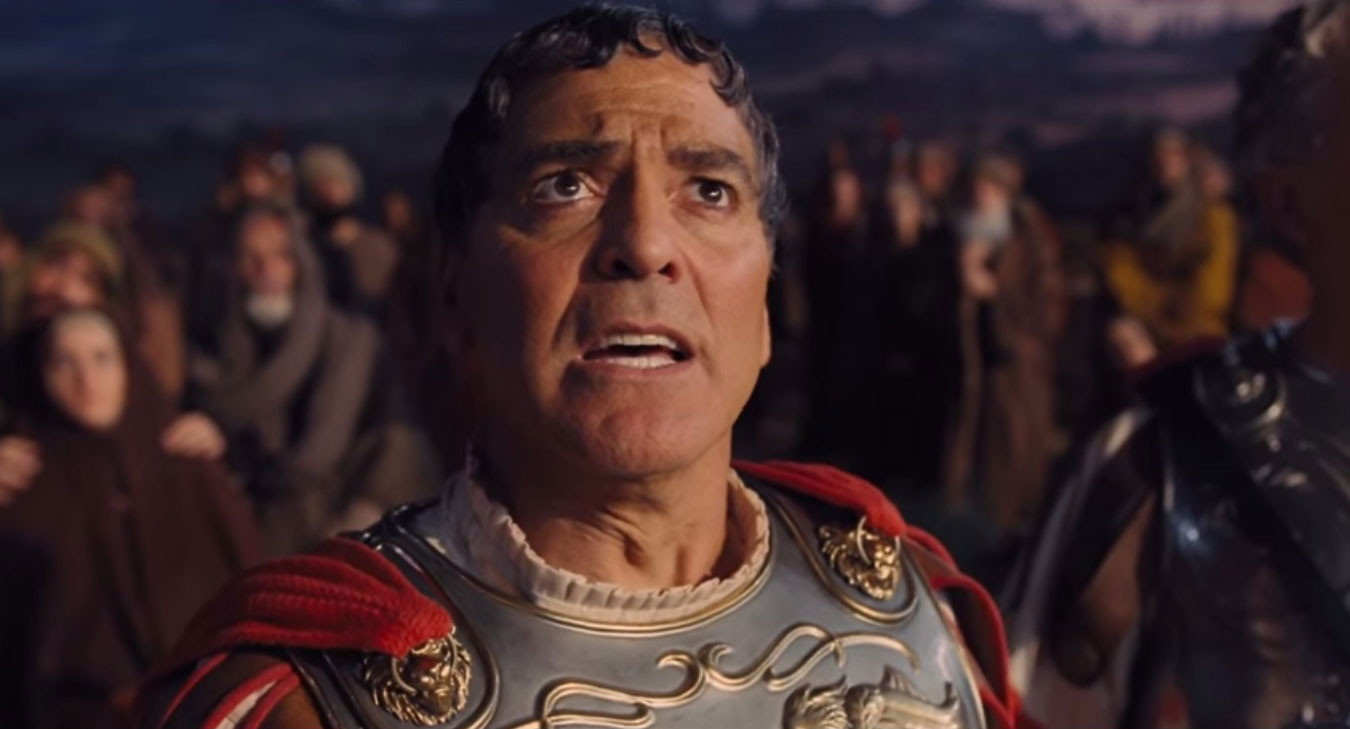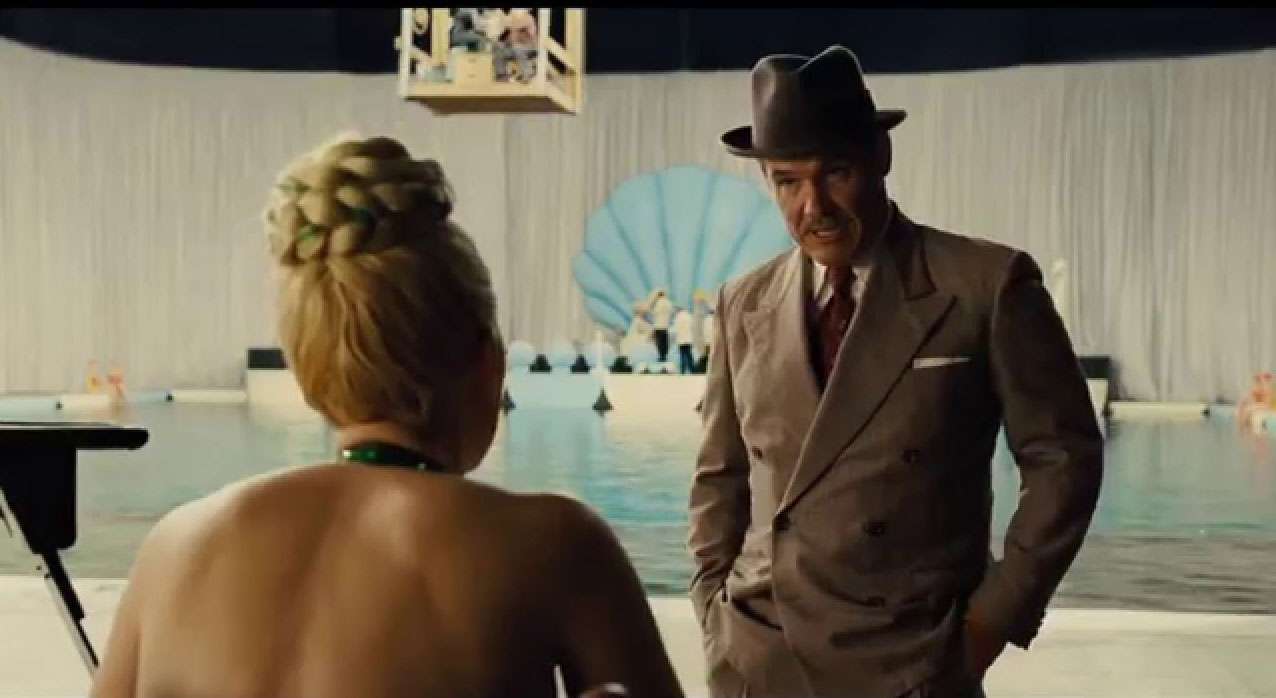Hail, Caesar!, the new film by Joel and Ethan Coen, is so buoyant and entertaining, so full of vivid cameo performances (Tilda Swinton as a voraciously predatory pair of twin gossip columnists; Scarlett Johansson as a promiscuous, tough-talking aquatic film star) and visual pleasures (a Busby Berkeley-style water ballet; a sequence celebrating the delirious homoerotic brio of a sailors-on-shore-leave musical extravaganza) that it’s almost possible to overlook the heavier themes that keep bobbing to the surface like Johansson’s slutty mermaid. But how can one fail to register the fact that the film begins and ends in a confessional booth, that it has at its center a cheesy costume epic (also called Hail, Caesar!) set at the time of Christ? As they so often have in the past, the Coen brothers bring a simultaneously grotesque and hilarious touch to matters of faith and ethics, and to the ways in which their goofy, befuddled humans grapple with the toughest questions: What can we believe in, and how are we to live?
The backdrop to Hail, Caesar! is the 1950s, and Hollywood is at its sunniest—and dreamiest. The guy in the dark confessional is Eddie Mannix (Josh Brolin), whose job combines the duties of a major studio executive with those of the shady fixer one contacts if a star or a production has gotten into serious trouble. Eddie is the one you call if the mermaid gets pregnant or if the film’s star vanishes from the set. His sins—he’s been lying to his wife about his resolve to quit smoking—can hardly hold the attention of the yawning priest, who ultimately suggests that Eddie might be confessing too little, too often.
But though neither of them seems to know it, what Eddie’s really confessing to is the vapidity, the much-ado-about-nothingness of how he lives and what he does: a life spent going to some fairly extreme lengths to facilitate the creation of a cultural product that is at once glorious and ridiculous. Eddie loves and despises Hollywood. He’s energized by the giddy panache with which films lift our spirits, amuse us, and enable audiences to inhabit a glamorous, gorgeous fantasy. But he also understands the essential cheapness and falsity of the illusions those films purvey, and how doggedly and tenaciously their creators cling to the glossy, unreal surface. He knows that for some—the Coen brothers among them, one assumes—film-making is nothing less than a matter of life and death.
In one brief, telling sequence, a film editor named C.C. Calhoun (Frances McDormand) is nearly strangled when her scarf gets caught in the editing machine, dramatically illustrating the ease with which art can kill. A brilliant subtheme running through the Coens’ film concerns the efforts of a headhunter from the aircraft industry to hire Eddie; his new job would have the advantages of regular hours and a more serious purpose. The recruiter proudly displays a photo of the A-bomb mushroom cloud to illustrate the importance of the profession that Eddie would be entering; no mention is made of the enormous amount of death and destruction that would be involved should Eddie choose to accept this sensible and attractive employment opportunity.
Expensive and elaborate, Hail, Caesar! has gone into production, and it falls to Eddie to organize a sort of focus group composed of a Catholic priest, a rabbi, a Protestant minister, and an Eastern Orthodox patriarch. The idea is to get their advice and their imprimatur, to sound them out: What do they want in a film about God? What do they think God is? The result is an immensely smart and funny scene—but I thought of it when I heard that, on the weekend it opened in theaters, Hail, Caesar! had been severely trounced at the box office by Kung Fu Panda 3: how admirable and heroic of the Coens to imagine a wide audience for the high comedy of an ecumenical conversation about the nature of the deity.
The epic costume drama, which the religious leaders have been summoned to weigh in on, tracks the spiritual progress of a Roman centurion, played by an actor named Baird Whitlock who is in turn played by George Clooney. Part of the ironic fun is the extent to which Whitlock’s personality mirrors Clooney’s, or at least Clooney’s public persona: remarkably amiable, smart but not too smart, a little slick, coasting on his charm at a height precisely calculated to encounter the minimum amount of turbulence and damage. Whitlock is unflappable, even when he is drugged, kidnapped from the film set, and whisked off to the Malibu den of a clandestine group of Communists who call themselves The Future.
Advertisement
Argumentative geeks spouting party lines, constantly theorizing and displaying their large impractical egos, advocating equality for the working class while ignoring the maid who’s vacuuming their luxurious seaside hide-out, the members of The Future personify every cliché about the radical left. Their leader turns out to be a heartthrob matinee idol (Channing Tatum) who steers the Coens’ film into the kitschy waters of Soviet Socialist cinema, as The Future’s theoreticians morph into a crew of chanting boatmen ferrying their captain (together with the ransom money they’ve gotten in exchange for Whitlock) out to sea and toward a rendezvous with a Soviet submarine.
The Coens’ portrayal of the Communists is far from purely unsympathetic, so perhaps I’m being hypersensitive when I say that this part of the film made me uneasy; I was reminded of the travails of the real-life Hollywood Communists and their so-called fellow travelers, men and women who presumably had no desire to deliver briefcases full of contraband cash to the Russians and be taken away, like alien abductees, by a Soviet submarine. It seems worth pointing out that the victims of the 1950s Hollywood Red Scare were even more badly served by the preachy, tedious Trumbo, which dumbed down Marxism to an idea that your little daughter could understand, as if communism was all about sharing your toys with others.
At one point, Whitlock’s centurion is muscling his way through a legion of marching Roman soldiers and a crowd of stumbling slaves when he encounters Christ, whose face (perhaps on the advice of the religious focus group) we never see, though we are afforded a view of the back of Christ’s head—that is, his flowing blond hair. Eventually, the centurion finds himself at the site of the Crucifixion Standing at the foot of the cross, he delivers an impassioned speech, a fervent and genuine exegesis of the highest ideals and principles of Christianity, something a bit like a toga-drama version of the Sermon on the Mount.
Has he gone off script? We can’t exactly tell, and it hardly matters. The Coens turn their lens away from Whitlock to show us the other people on set—cameramen, script girls, an entire support staff moved to the edge of tears by the beauty and the power of the centurion’s speech. There’s another level of irony here, to which the Coens’ audience is privy: Whitlock is an easy mark for conversion and has only lately recovered—a turnaround assisted by the threat that his dark secrets will be revealed—from a flirtation with communism and a transient interest in how the studio system exploits its workers’ labor, his included.
Moments such as this one are often what we remember best about the Coen brothers’ films: scenes in which they appear to have encouraged the actors to show what they can do and not worry about overacting. It’s a great pleasure to watch gifted actors exceed whatever one might have thought was their limit: John Turturro pleading for his life in Miller’s Crossing; John Goodman losing what remains of his sanity in Barton Fink; Billy Bob Thornton’s horror at having committed a murder in The Man Who Wasn’t There; Michael Stuhlbarg’s unhelpful conversations with the rabbis in A Serious Man; every speech that Frances McDormand delivers in her role as the small-town Midwestern cop in Fargo, her steadiness and common sense serving as a counterpoint to the depths of panic and despair into which William H. Macy’s hapless used-car salesman is sliding.
No one (except perhaps Hitchcock) is as skilled as the Coens in documenting the ways in which a life can take a sudden, unplanned, unexpected—and unstoppable—turn for the worse; the dialogue and images that accompany these rapid descents stay with us, whether we like it or not. Ever since I saw Barton Fink, I’ve never heard anyone refer to “the life of the mind” without seeing John Goodman as the psycho-killer Charlie, hurtling down the blazing corridor, flames shooting out behind him, cradling a rifle in his arms and shouting, “I’ll show you the life of the mind!”
Like all the best films, Hail, Caesar! alters how the world looks to us—the sharpness with which we pay attention to reality—after we’ve left the theater. Riding the escalator down in the multiplex where I saw the film, I couldn’t help noticing the posters heralding the features slated to open during the next few weeks. The three films receiving the most advance publicity were all costume epics. One (Gods of Egypt) takes place during the age of the pharaohs, while the other two—Risen and The Young Messiah—have, as their subject, or partial subject, the life and teachings of Christ. More than half a century after the era in which Hail, Caesar! is set, Hollywood is still making pictures of the sort that would likely contain a meaty role for an actor like Baird Whitlock, but which will presumably lack the irony, the nuance, the humor—and the fun—which the Coen brothers have brought to this latest chapter in their ongoing exploration of how we live, or try to live, in the presence or absence of the divine.
Advertisement




